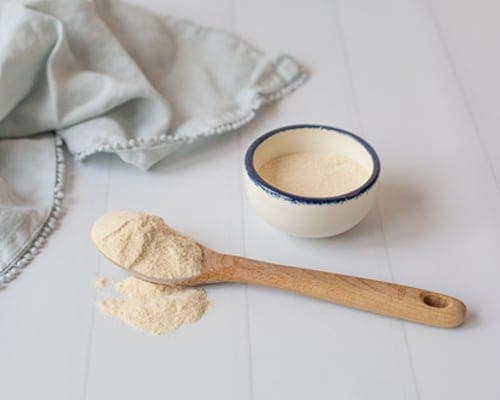Fiber Fuels Good Gut Microbes
- 12/29/15
You have a diet, but your gut microbes have a diet, too. And they really enjoy and thrive with fiber, especially certain kinds of fiber.
While we have heard so much about the importance of probiotics—and they are truly essential for gut health—certain fibers are extremely important as well for fueling those friendly gut bacteria.
Justin Sonnenberg, a biologist at Stanford University, says, “Diet is one of the most powerful tools we have for changing the microbiota. Dietary fiber and diversity of the microbiota complement each other for better health outcomes.”
Fiber has a long list of health benefits, but newer research points out that our gut microbes and microbiota may strongly and positively influence those health benefits and overall health. In fact, at least one study shows that adding more dietary fiber can cause a shift from a microbial profile associated with obesity to one that is related to a leaner body.† Other recent studies reveal that when your gut microbes don’t get enough fiber, then they may turn to feeding on your gut’s protective mucous membrane lining, which can lead to inflammation and disease, including ulcerative colitis and more.†
Our good microbes have a feeding frenzy on fermentable fibers, which are those from a variety of vegetables and other plant foods. They resist digestion as they travel along our guts, arriving mostly intact in our large intestine, ready to be consumed by our microbial community, so that those microbes can extract the fiber’s extra energy, vitamins and other nutrients for us.† As a matter of fact, the short-chain fatty acids taken in from fiber have been linked to improved immune function, decreased inflammation and guarding against obesity.†
That is such great information about how fiber affects our health, but the problem is that most of us don’t get the recommended daily intake of fiber—of any kind. In fact, the Western diet contains approximately 15 grams of fiber daily, but we should be getting anywhere from 25 grams to 38 grams of fiber daily, depending on caloric intake, your age and whether you are a man of woman. Our hunter-gatherer ancestors, however, consumed even more than that—up to 150 grams of fiber daily.
The truth is that, overall, we have decreased fiber intake dramatically and it is affecting our health. Sonnenburg notes, “Imagine the effect that has on our microbiome over the course of our evolution.”
We don’t have to eat the kinds of roots or roughage our ancestors ate in order to see benefits, though. We can get fiber in other ways. For example, adding supplemental fiber can work to positively sway microbes in favor of a lower BMI and a leaner body as well as providing fiber for your microbes to feed on instead of feeding on your gut’s protective mucous membrane lining.† Studies have even pointed out that genes in the gut microbiome can even be positively affected by consistent, adequate fiber intake.†
Wow.
And note this: an on-again, off-again high-fiber diet can result in some undesired consequences, such as thinning of the mucous membrane lining of the gut, which could make you more vulnerable to gut problems and more. Lack of daily optimal fiber amounts can also shift your microbial profile back to unfavorable microbes.†
In short, you want to meet your fiber goals daily. Period. Don’t let up.
So, be sure to make fiber part of your daily health regimen.
This information is intended for educational and informational purposes only. It should not be used in place of an individual consultation or examination or replace the advice of your health care professional and should not be relied upon to determine diagnosis or course of treatment.
While we have heard so much about the importance of probiotics—and they are truly essential for gut health—certain fibers are extremely important as well for fueling those friendly gut bacteria.
Justin Sonnenberg, a biologist at Stanford University, says, “Diet is one of the most powerful tools we have for changing the microbiota. Dietary fiber and diversity of the microbiota complement each other for better health outcomes.”
Fiber has a long list of health benefits, but newer research points out that our gut microbes and microbiota may strongly and positively influence those health benefits and overall health. In fact, at least one study shows that adding more dietary fiber can cause a shift from a microbial profile associated with obesity to one that is related to a leaner body.† Other recent studies reveal that when your gut microbes don’t get enough fiber, then they may turn to feeding on your gut’s protective mucous membrane lining, which can lead to inflammation and disease, including ulcerative colitis and more.†
Our good microbes have a feeding frenzy on fermentable fibers, which are those from a variety of vegetables and other plant foods. They resist digestion as they travel along our guts, arriving mostly intact in our large intestine, ready to be consumed by our microbial community, so that those microbes can extract the fiber’s extra energy, vitamins and other nutrients for us.† As a matter of fact, the short-chain fatty acids taken in from fiber have been linked to improved immune function, decreased inflammation and guarding against obesity.†
That is such great information about how fiber affects our health, but the problem is that most of us don’t get the recommended daily intake of fiber—of any kind. In fact, the Western diet contains approximately 15 grams of fiber daily, but we should be getting anywhere from 25 grams to 38 grams of fiber daily, depending on caloric intake, your age and whether you are a man of woman. Our hunter-gatherer ancestors, however, consumed even more than that—up to 150 grams of fiber daily.
The truth is that, overall, we have decreased fiber intake dramatically and it is affecting our health. Sonnenburg notes, “Imagine the effect that has on our microbiome over the course of our evolution.”
We don’t have to eat the kinds of roots or roughage our ancestors ate in order to see benefits, though. We can get fiber in other ways. For example, adding supplemental fiber can work to positively sway microbes in favor of a lower BMI and a leaner body as well as providing fiber for your microbes to feed on instead of feeding on your gut’s protective mucous membrane lining.† Studies have even pointed out that genes in the gut microbiome can even be positively affected by consistent, adequate fiber intake.†
Wow.
And note this: an on-again, off-again high-fiber diet can result in some undesired consequences, such as thinning of the mucous membrane lining of the gut, which could make you more vulnerable to gut problems and more. Lack of daily optimal fiber amounts can also shift your microbial profile back to unfavorable microbes.†
In short, you want to meet your fiber goals daily. Period. Don’t let up.
So, be sure to make fiber part of your daily health regimen.
This information is intended for educational and informational purposes only. It should not be used in place of an individual consultation or examination or replace the advice of your health care professional and should not be relied upon to determine diagnosis or course of treatment.





